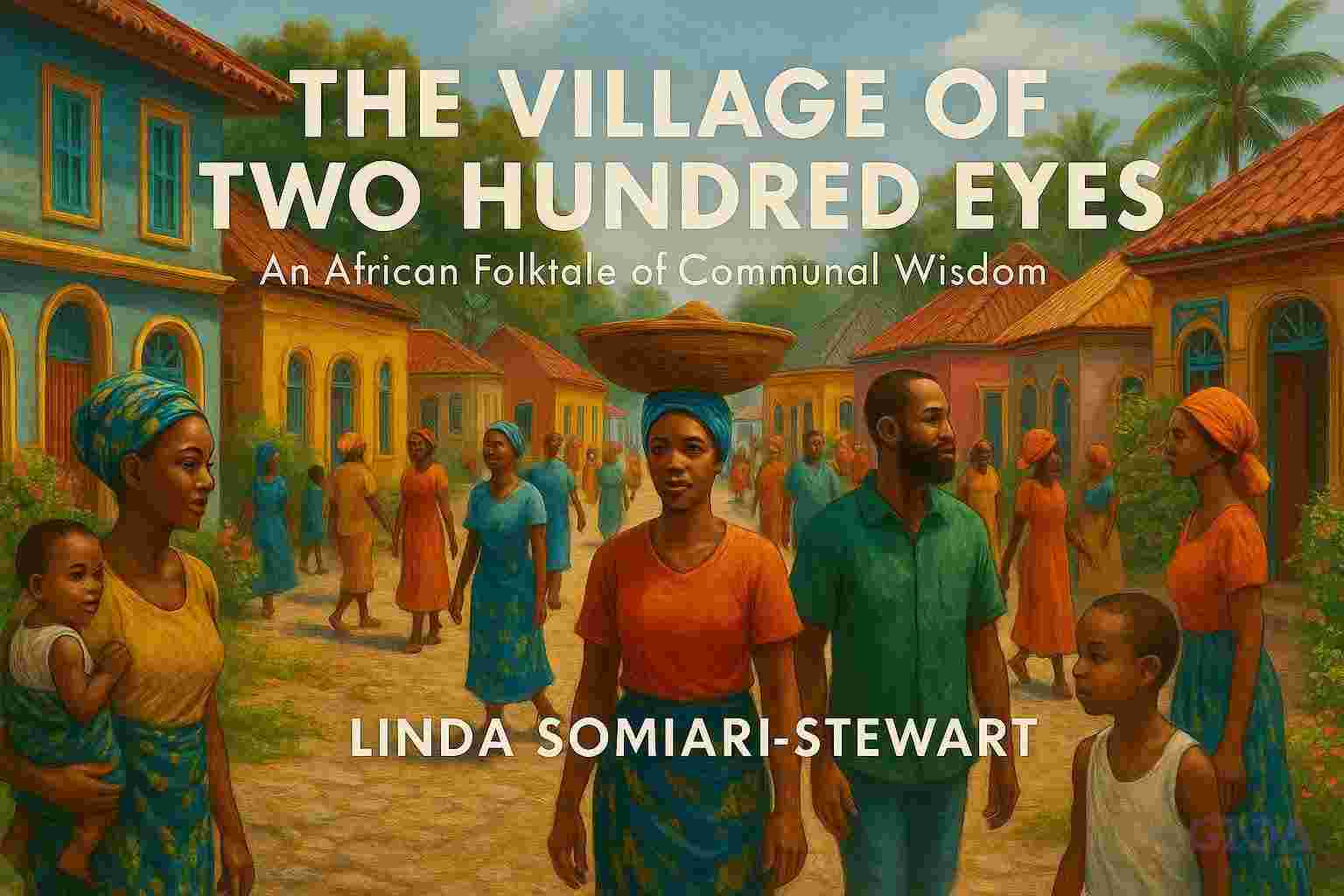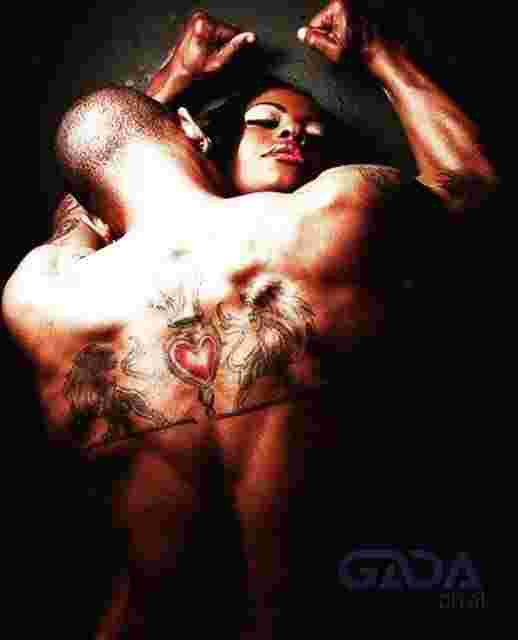THE VILLAGE OF THE TWO HUNDRED EYES
An African Folktale of Communal Wisdom
by
Linda Somiari - Stewart
In the heart of the green valley of N’nika, where hills rolled like the backs of resting lions and baobab trees whispered secrets to the stars, a child was born on a moonlit night.
Her name was Zoya, which means “peace after longing.” Her mother, Amina, had wept for many seasons, her womb quiet like an abandoned fireplace. Her father, Kwaku, had prayed by rivers and planted trees that never bore fruit. But when Zoya arrived, laughter returned to their home like rain after drought.
Now, in many places worldwide, a child is considered the property of the parents. “My daughter,” “my son.” But in N’nika, a child belongs to the people. There, they say, “A child is birthed by four eyes, but nurtured by two hundred.”
And so, Zoya was not only the joy of her mother and father, she was the moonbeam of the village. Her first laugh echoed from hut to hut like festival drums. When she took her first step, an elder carved the memory into wood. When she said her first word—"Maji" (water)—the village griot sang it into the evening fire.
Each villager played their part. Old Mama Binta, whose eyes had dimmed but whose spirit saw clearly, taught Zoya riddles and proverbs. Uncle Sefu, who shaped clay like it was born in his palms, showed her how to mold earth into beauty. Auntie Dede, swift-footed as a gazelle, taught her to dance on the drum’s breath. Even Blind Baba Chikere, who never saw her face, listened to her soul and reminded her, “You are more than what eyes can see.”
One day, when the rains were late and the air cracked with dryness, Zoya, now a child of seven seasons, saw a brilliant green butterfly flutter past. Her eyes widened. She remembered Mama Binta's tale: “The butterfly that glows like emerald flies toward old magic.” Curious, fearless, Zoya followed.
She wandered into the forest, past the watchful iroko tree, into the thick silence where children were told not to stray.
Hours passed. Shadows lengthened. The sun bowed out.
Panic rose like smoke in Amina’s chest. Kwaku’s hands trembled. But before their fear became thunder, the village moved.
Mama Binta said, “She spoke of butterflies this morning.”
Uncle Sefu recalled, “She asked me about the old stone under the iroko tree, the one shaped like wings.”
After pausing her grinding, Auntie Dede added, “I saw her head toward the bush path near the river bend.”
No one said, “Not my child.”
Because Zoya belonged to all of them.
The drum was sounded - not in alarm, but in unity. Two hundred eyes awakened. Old legs and young feet marched. Voices called her name not angrily but with love braided into every syllable.
They found her just as dusk kissed the sky. She sat peacefully beside a stone shaped like wings, humming a song she had learned from Baba Chikere. When asked if she was scared, she said, “No. I knew someone would come. Someone always comes when someone is lost.”
That night, under a sky heavy with stars and the smell of roasted maize, the village held a feast - not just for Zoya’s return, but for the power of many eyes, hands, and hearts.
Zoya grew into a woman of many talents. She became a healer, a teacher, and a singer of old songs. When she had her own child, she did not build a wall around them. She opened her door wide.
And when strangers from far lands encounter her versatility, they would ask, “Who taught you such wisdom?” She would say: “The eyes that watched me were many.
The love that raised me was village-wide and deep.”
And so, dear friend, learn this: The natural order is not to raise any child alone. Whether in Nairobi or New York, Lagos or London, an authentic village is not made of huts and fences - but of hearts willing to see, hands willing to hold, and spirits willing to lift. Please do your best to return the natural order to our neighborhoods and villages.
An African Folktale of Communal Wisdom
by
Linda Somiari - Stewart
In the heart of the green valley of N’nika, where hills rolled like the backs of resting lions and baobab trees whispered secrets to the stars, a child was born on a moonlit night.
Her name was Zoya, which means “peace after longing.” Her mother, Amina, had wept for many seasons, her womb quiet like an abandoned fireplace. Her father, Kwaku, had prayed by rivers and planted trees that never bore fruit. But when Zoya arrived, laughter returned to their home like rain after drought.
Now, in many places worldwide, a child is considered the property of the parents. “My daughter,” “my son.” But in N’nika, a child belongs to the people. There, they say, “A child is birthed by four eyes, but nurtured by two hundred.”
And so, Zoya was not only the joy of her mother and father, she was the moonbeam of the village. Her first laugh echoed from hut to hut like festival drums. When she took her first step, an elder carved the memory into wood. When she said her first word—"Maji" (water)—the village griot sang it into the evening fire.
Each villager played their part. Old Mama Binta, whose eyes had dimmed but whose spirit saw clearly, taught Zoya riddles and proverbs. Uncle Sefu, who shaped clay like it was born in his palms, showed her how to mold earth into beauty. Auntie Dede, swift-footed as a gazelle, taught her to dance on the drum’s breath. Even Blind Baba Chikere, who never saw her face, listened to her soul and reminded her, “You are more than what eyes can see.”
One day, when the rains were late and the air cracked with dryness, Zoya, now a child of seven seasons, saw a brilliant green butterfly flutter past. Her eyes widened. She remembered Mama Binta's tale: “The butterfly that glows like emerald flies toward old magic.” Curious, fearless, Zoya followed.
She wandered into the forest, past the watchful iroko tree, into the thick silence where children were told not to stray.
Hours passed. Shadows lengthened. The sun bowed out.
Panic rose like smoke in Amina’s chest. Kwaku’s hands trembled. But before their fear became thunder, the village moved.
Mama Binta said, “She spoke of butterflies this morning.”
Uncle Sefu recalled, “She asked me about the old stone under the iroko tree, the one shaped like wings.”
After pausing her grinding, Auntie Dede added, “I saw her head toward the bush path near the river bend.”
No one said, “Not my child.”
Because Zoya belonged to all of them.
The drum was sounded - not in alarm, but in unity. Two hundred eyes awakened. Old legs and young feet marched. Voices called her name not angrily but with love braided into every syllable.
They found her just as dusk kissed the sky. She sat peacefully beside a stone shaped like wings, humming a song she had learned from Baba Chikere. When asked if she was scared, she said, “No. I knew someone would come. Someone always comes when someone is lost.”
That night, under a sky heavy with stars and the smell of roasted maize, the village held a feast - not just for Zoya’s return, but for the power of many eyes, hands, and hearts.
Zoya grew into a woman of many talents. She became a healer, a teacher, and a singer of old songs. When she had her own child, she did not build a wall around them. She opened her door wide.
And when strangers from far lands encounter her versatility, they would ask, “Who taught you such wisdom?” She would say: “The eyes that watched me were many.
The love that raised me was village-wide and deep.”
And so, dear friend, learn this: The natural order is not to raise any child alone. Whether in Nairobi or New York, Lagos or London, an authentic village is not made of huts and fences - but of hearts willing to see, hands willing to hold, and spirits willing to lift. Please do your best to return the natural order to our neighborhoods and villages.
THE VILLAGE OF THE TWO HUNDRED EYES
An African Folktale of Communal Wisdom
by
Linda Somiari - Stewart
In the heart of the green valley of N’nika, where hills rolled like the backs of resting lions and baobab trees whispered secrets to the stars, a child was born on a moonlit night.
Her name was Zoya, which means “peace after longing.” Her mother, Amina, had wept for many seasons, her womb quiet like an abandoned fireplace. Her father, Kwaku, had prayed by rivers and planted trees that never bore fruit. But when Zoya arrived, laughter returned to their home like rain after drought.
Now, in many places worldwide, a child is considered the property of the parents. “My daughter,” “my son.” But in N’nika, a child belongs to the people. There, they say, “A child is birthed by four eyes, but nurtured by two hundred.”
And so, Zoya was not only the joy of her mother and father, she was the moonbeam of the village. Her first laugh echoed from hut to hut like festival drums. When she took her first step, an elder carved the memory into wood. When she said her first word—"Maji" (water)—the village griot sang it into the evening fire.
Each villager played their part. Old Mama Binta, whose eyes had dimmed but whose spirit saw clearly, taught Zoya riddles and proverbs. Uncle Sefu, who shaped clay like it was born in his palms, showed her how to mold earth into beauty. Auntie Dede, swift-footed as a gazelle, taught her to dance on the drum’s breath. Even Blind Baba Chikere, who never saw her face, listened to her soul and reminded her, “You are more than what eyes can see.”
One day, when the rains were late and the air cracked with dryness, Zoya, now a child of seven seasons, saw a brilliant green butterfly flutter past. Her eyes widened. She remembered Mama Binta's tale: “The butterfly that glows like emerald flies toward old magic.” Curious, fearless, Zoya followed.
She wandered into the forest, past the watchful iroko tree, into the thick silence where children were told not to stray.
Hours passed. Shadows lengthened. The sun bowed out.
Panic rose like smoke in Amina’s chest. Kwaku’s hands trembled. But before their fear became thunder, the village moved.
Mama Binta said, “She spoke of butterflies this morning.”
Uncle Sefu recalled, “She asked me about the old stone under the iroko tree, the one shaped like wings.”
After pausing her grinding, Auntie Dede added, “I saw her head toward the bush path near the river bend.”
No one said, “Not my child.”
Because Zoya belonged to all of them.
The drum was sounded - not in alarm, but in unity. Two hundred eyes awakened. Old legs and young feet marched. Voices called her name not angrily but with love braided into every syllable.
They found her just as dusk kissed the sky. She sat peacefully beside a stone shaped like wings, humming a song she had learned from Baba Chikere. When asked if she was scared, she said, “No. I knew someone would come. Someone always comes when someone is lost.”
That night, under a sky heavy with stars and the smell of roasted maize, the village held a feast - not just for Zoya’s return, but for the power of many eyes, hands, and hearts.
Zoya grew into a woman of many talents. She became a healer, a teacher, and a singer of old songs. When she had her own child, she did not build a wall around them. She opened her door wide.
And when strangers from far lands encounter her versatility, they would ask, “Who taught you such wisdom?” She would say: “The eyes that watched me were many.
The love that raised me was village-wide and deep.”
And so, dear friend, learn this: The natural order is not to raise any child alone. Whether in Nairobi or New York, Lagos or London, an authentic village is not made of huts and fences - but of hearts willing to see, hands willing to hold, and spirits willing to lift. Please do your best to return the natural order to our neighborhoods and villages.








